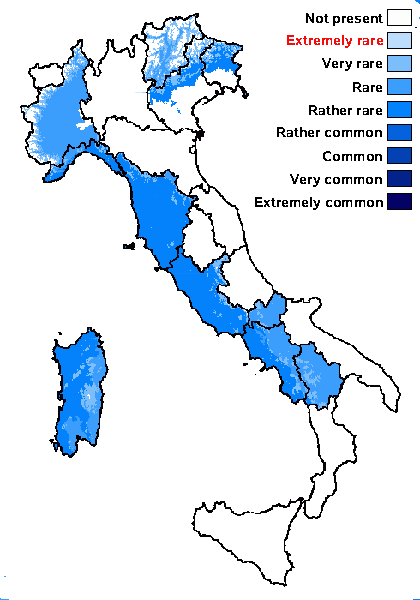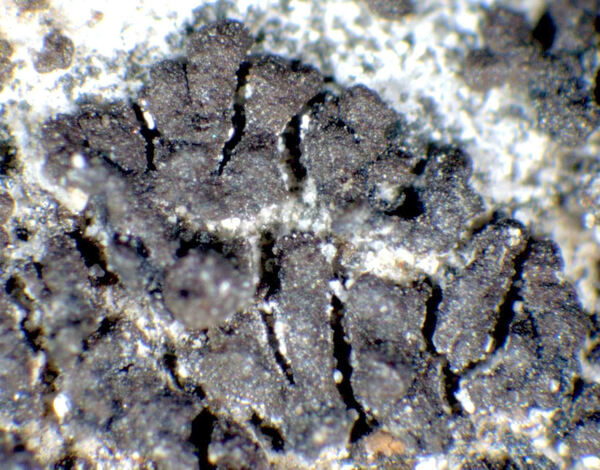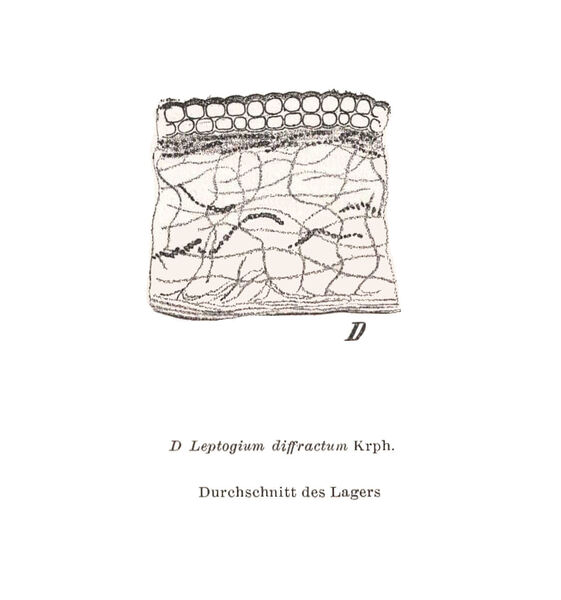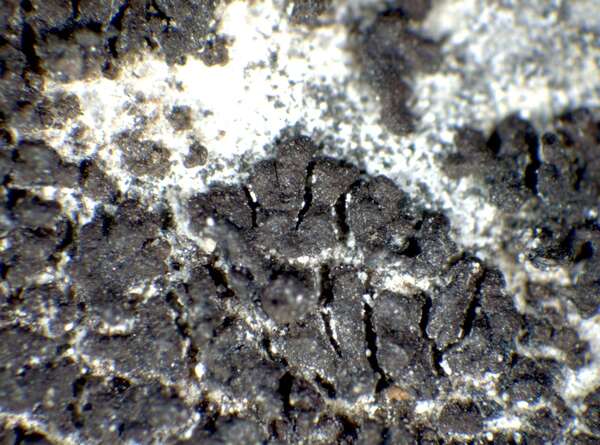Pseudoleptogium diffractum (Körb.) Müll. Arg.
Flora, 68: 516, 1885. Basionym: Leptogium diffractum Kremp. ex Körb. - Parerga Lichenol.: 424, 1865.
Synonyms: Leptogium placodiellum Nyl.
Distribution: N - VG, Frl, Ven (Jatta 1909-1911), TAA, Piem (Isocrono & al. 2004), Lig. C - Tosc, Laz, Mol (Nimis & Tretiach 1999, Caporale & al. 2008), Sar. S - Camp (Aprile & al. 2003b, Nimis & Tretiach 2004), Bas (Bartoli & Puntillo 1998).
Description: Thallus crustose-placodioid to subsquamulose-placodioid, gelatinous when wet, forming 0.5-1 cm wide rosettes, sometimes more thalli coalescing into larger patches, the marginal lobes radiating, 0.4-1.3 mm long, 0.2-0.5 mm wide, flat to convex, contiguous for most of their length, often wrinkled and glossy at lobe ends, dark olive brown to black; center of thallus with convex 0.1-0.2(-0.3) mm wide areoles or granules, often dying off to leave semicircular areas of lobes. Thallus anatomy paraplectenchymatous, of short-celled, compact hyphae, with a distinct cortex of smaller cells. Apothecia very rare, 0.2-0.5 mm across, with an olivaceous brown disc and a thin thalline margin. Epithecium brownish; hymenium and hypothecium colourless; paraphyses coherent, mostly simple, the apical cells slightly swollen. Asci 8-spored, cylindrical-clavate, the apex strongly thickened, the apical dome K/I+ pale blue, with a downwardly projecting K/I+ deep blue tubular structure. Ascospores submuriform, hyaline, ellipsoid (15-)22-25(-30) x 8-10(-12) μm. Photobiont cyanobacterial (Nostoc, the individual cells 4-6 µm wide, arranged in clusters). Spot tests: all negative. Chemistry: without lichen substances.Note: a mainly temperate to Mediterranean species found on steeply inclined seepage tracks of hard calcareous rocks.
Growth form: Crustose placodiomorph
Substrata: rocks
Photobiont: cyanobacteria, filamentous (e.g. Nostoc, Scytonema)
Reproductive strategy: mainly sexual
On otherwise dry surfaces with short periods of water seepage after rain
Commonnes-rarity: (info)
Alpine belt: absent
Subalpine belt: absent
Oromediterranean belt: absent
Montane belt: very rare
Submediterranean belt: rare
Padanian area: absent
Humid submediterranean belt: rather rare
Humid mediterranean belt: rather rare
Dry mediterranean belt: rare

Predictive model
Herbarium samples
Growth form: Crustose placodiomorph
Substrata: rocks
Photobiont: cyanobacteria, filamentous (e.g. Nostoc, Scytonema)
Reproductive strategy: mainly sexual
On otherwise dry surfaces with short periods of water seepage after rain
Commonnes-rarity: (info)
Alpine belt: absent
Subalpine belt: absent
Oromediterranean belt: absent
Montane belt: very rare
Submediterranean belt: rare
Padanian area: absent
Humid submediterranean belt: rather rare
Humid mediterranean belt: rather rare
Dry mediterranean belt: rare

Predictive model
| Herbarium samples |
 INDEX FUNGORUM
INDEX FUNGORUM
 GBIF
GBIF
 DOLICHENS
DOLICHENS





